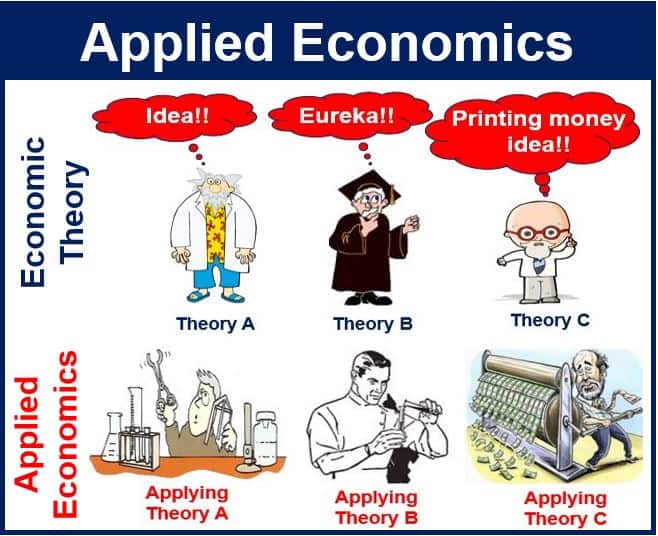Applied Economics is the study of economics in world situations as opposed to the theory of economics. It is the application of economic principles and theories to real situations, and trying to predict the outcomes.
The meaning of “applied”
Put simply; applied economics is the study of observing how theories work in practice. The discipline may be practiced at *macroeconomic or *microeconomic levels.
** ‘Macroeconomics’ refers to the whole aggregate economy, while ‘microeconomics’ looks at economics at the individual consumer company level.
We add the term “applied” to many subjects of study to denote a practical, real-world application of theoretical knowledge in a specific field.
Applied physics, for example, means using physics concepts for technological development, bridging theory with practical applications in fields like electronics and materials science. Applied chemistry refers to employing chemical principles to solve real-world problems, leading to innovations in pharmaceuticals, environmental science, and material production.
Applying economics to the status of the economy of a country helps eliminate all attempts to dress it up. In other words, applied economics prevents making situations appear better or worse than they are.
An economist, i.e., an economics expert, studied applied economics at university.

A true and complete picture
Only with applied economics can a true and complete picture of an economic situation or theory emerge. Then, decision-makers can choose what to do to move in the right direction from a current position.
Applied economics integrates interdisciplinary methods from fields such as mathematics, law, and geography to address complex economic issues.
The University of Maryland said that a background in applied economics allows people to make informed future trends forecasts. Applied economics also emphasizes predictive analytics, which utilizes statistical techniques to forecast future trends based on historical data. A trend is the perceived direction towards which a market, for example, is heading.
The University of Maryland added:
“Evidence-based policy making replaces ideology with careful definition of problems, collection and analysis of data, and well-reasoned program evaluations.”
“Professionals who can analyze and interpret sophisticated economic data and intelligently apply economic theory are able to better assess the economic impact of key public policy questions.”
A brief history of the term “applied economics”
Economic historians say that the term emerged nearly 200 years ago, in the writings of French economist and businessman Jean-Baptiste Say (1767-1832). Additionally, British political economist, philosopher, and civil servant John Stuart Mill (1806-1873) also mentioned the term.
Mr. Say wrote about applying the general principles of political economy. In 1848, Mr. Mill used the term in his work Principles of Political Economy with Some of Their Applications to Social Philosophy.
Should I study Economics or Applied Economics?
When wondering whether to study Economics or Applied Economics at university, bear in mind, the two courses are quite different. In fact, applied economics covers fewer core theoretical modules and more applied modules compared to economics.
Put simply, economics is the study of theories, while applied economics is observing what happens when you test them. We call the testing of economic theory with statistical and mathematical methods econometrics. However, both courses offer very similar career opportunities.
Example sentences
Below are some example sentences containing the words “applied economics,” to help you see how we can use the term in context:
- “The government’s policy-making process has increasingly relied on applied economics to ensure that legislative measures are both efficient and equitable.”
- “During her internship, she conducted a case study using applied economics to assess the viability of renewable energy subsidies in rural communities.”
- “The course on applied economics this semester covers a range of topics, including market analysis, economic development, and fiscal policy.”
- “Applied economics was pivotal in the company’s strategic decision to expand into emerging markets, considering both the microeconomic and macroeconomic factors.”
- “Researchers in applied economics have contributed to groundbreaking work on income inequality and its impact on economic growth.”
- “The seminar on applied economics provided insights into how economic theories are tested and implemented in various sectors, from agriculture to technology.”
- “His expertise in applied economics has been instrumental in designing programs aimed at reducing unemployment rates during economic downturns.”
Video – What is Applied Economics
This video presentation, from our sister channel on YouTube – Marketing Business Network, explains what ‘Applied Economics’ is using simple and easy-to-understand language and examples.
